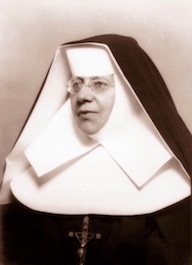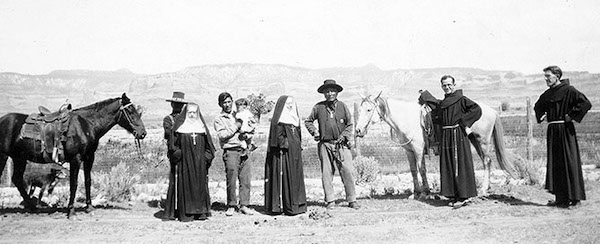There Will Your Heart Be Also
- ANTHONY ESOLEN
Indulge me, reader, while I set a remarkable stage:
Join the worldwide Magnificat family by subscribing now: Your prayer life will never be the same!
 Saint Katharine Mary Drexel
Saint Katharine Mary Drexel1858-1955
In 1837, Francis Martin Drexel, a Catholic émigré from Austria, a portrait painter, founded a banking house in Philadelphia. He painted the rich, so he had come to know who among them was morally solid and who was not. He brought his oldest sons, Francis and Anthony, into the business. They were thirteen and eleven years old. When the gold rush struck in California in 1849, the elder Drexel set up shop there, while the lads ran the business back home. The Drexel bank became one of the richest in the nation, helping to finance the Union Army during the Civil War.
In 1860, the son Francis, a young widower with two daughters, Elizabeth and Katharine ("Katie" as they called her), married a woman named Emma Bouvier. Emma brought him more deeply into his Catholic faith. He would come home from work and retire to play sacred music on the organ; and he and Emma and the girls — a third daughter was born to them — set aside time every evening to pray and sing in the room she set up as an oratory.
Prayer and song were not their only expressions of faith. Acts of the heart accompanied them. Throughout the week, Emma's agent, Mary Bilger, visited the slums in Philadelphia, looking for people in need: widows and orphans; people, white and colored, displaced from devastated lands in the south; the human sawdust of the industrial revolution. She gave them tickets to show up at the Drexel house. There Emma spoke to them face to face, with the girls present. Mostly they needed money for rent, groceries, and clothing — especially shoes. This was personal charity. Emma had a stake in the success of those to whom she gave. She kept records. She told the girls it was wrong to cast money broadside. You must have, she wrote, "the keenness of a knave, the kindness of a fool, and the judgment of a philosopher."
The wealth she gave yearly, with her husband's glad approval, was immense. But she gave more from her person. Katie inherited from her parents a vibrant and active faith; determination to get jobs done; the shrewdness of a businessman; and humility — the humility to be involved in the lives of the lowliest of men.
Go west, young woman
It is 1887. Francis and Emma have passed away. The Drexel girls, "We Three" as they jestingly call themselves, are in Rome. It's been a long journey. They are wealthy heiresses, seeking to do God's work. They have visited many a monastery, begging for priests and sisters to come to the western world to minister to the Indians. Now they stand before Pope Leo XIII.
"Why not, my child," said the pope to Katharine, "yourself become a missionary?"
You must have, she wrote, "the keenness of a knave, the kindness of a fool, and the judgment of a philosopher."
Why the Indians? In 1881, the editors of The Century Magazine, Protestants not unfriendly to the Catholic Church, sent Helen Hunt Jackson out west to write about the state of the Indian tribes. She visited the California missions, in ruins since the Mexican War. She pored over the records the friars kept. She spoke to old people who remembered the time of the fathers, rich times, when there was plenty to eat, when thousands of Indians in the missions became farmers, herders, weavers, millers, vintners, blacksmiths, tanners, and engineers. "Dem work for civilize," said an elderly Indian to her, "not for money. Dey work to religion."
Imagine the contrast between the coasts: on the Atlantic, "the descendants of the Puritans, weighed down by serious purpose, half grudging the time for their one staid yearly Thanksgiving, and driving the Indians farther and farther into the wilderness every year," killing them while they were at it, while on the Pacific, "the merry people of Mexican and Spanish blood...dancing away whole days and nights like children, while their priests were gathering the Indians by thousands into communities, and feeding and teaching them."
That was gone, and Americans were much to blame. Jackson's book, A Century of Dishonor, describing a hundred years of neglect, error, and treachery, kindled a fire in Katie's soul. She too went west in 1884 and toured the country, meeting the Dakota wise man Red Cloud, who pleaded with her to send the "black robes" there to teach his people. Jackson, "Helen of Colorado" as Emily Dickinson called her, was dying of stomach cancer. I like to think that Katie sought her out in her journey. What had been done before could be done again. The Church must do it.
The least of these
It is 1893, and Katie, now Mother Katharine Mary Drexel of the new Sisters of the Blessed Sacrament for Indians and Colored People, is writing to her small flock. She has given up the social life of a Philadelphia heiress. It took her years to persuade her old parish priest and spiritual director, Father James O'Connor, now Bishop of Omaha, that she had a vocation to the religious life. She has appealed to Patrick Ryan, Archbishop of Philadelphia, for permission to set out among the Indians. He refuses. Her order is too young, too new. They must wait.
 Mother M. Francis Xavier McCann and St. Katharine Drexel with Navajo men and two Franciscans
Mother M. Francis Xavier McCann and St. Katharine Drexel with Navajo men and two Franciscans near St. Michaels, Ariz, where the Sisters of the Blessed Sacrament teach at St. Michael Indian School.
Photo courtesy of the Archives of the Sisters of the Blessed Sacrament.
"Sisters," she says, "we can make an act of humility, we are not fit instruments for apostolic labor among the Indians of New Mexico. Do not let this, however, deter us in the work of our sanctification." You can't give what you don't have. Mother Katharine had money. That was not enough. Money is only instrumental. The sisters wanted to give to blacks and Indians a share in the life of God. Hence, she says, they must die to themselves and let God reign in their hearts, and then "He will in his own time choose us to go and work in his vineyard," to bring in the bountiful harvest of souls.
See the ledger of Saint Katharine Drexel's apostolate: intelligence, determination, and a loving humility. When Archbishop Ryan finally agreed that her order was ready, she was a dynamo in action. Klansmen burnt a cross on the grounds of her motherhouse. But what was a little fire and wood, against the factory of love burning in her heart? Some people thought she had fled to the convent in sorrow. That was nonsense, she said. "I am, and I have always been, one of the happiest women in the world."
The greatest of her projects, twenty years in the making, was a college for black people, the only such Catholic college in the country: Xavier University in New Orleans.
The sisters built schools everywhere, from the tidewater of Virginia to the California coast. I'm looking at a photo of Mother Katharine among several small black children dressed in white, in front of a school. She's leaning over, holding the littlest, who seems to have lost something in the grass. Another photo: she is standing by the wall of a churchyard with several Indians, most of them elderly, with years of poverty, suffering, and endurance carved into their faces. She extends her right hand to touch the right hand of an old man. Another: she's bent over, smiling, her face tanned from the southern sun, as she pins a flower to the coat of a little Indian girl, perhaps for her First Communion.
The greatest of her projects, twenty years in the making, was a college for black people, the only such Catholic college in the country: Xavier University in New Orleans. I see a photo of Mother Katharine in a kitchen there, with pans on the stove, and seven young black women roundabout her — listening to a recipe for soup, it seems! Surely she kept the vows she had made so long before, promising poverty, chastity, and obedience, in an effort "to be the Mother and Servant of the Indian and Negro races," and never to undertake any work which might tend to their neglect or abandonment.
May the sun rise again
That Katie who knew President Grant as a family friend, who petitioned President Hayes on behalf of the Dakotas, lived to see a distant cousin on her mother's side, Jacqueline, marry a man named John, soon to be president. Through all her ninety-six years, she used her father's fortune in wise and generous ways, though she herself lived plainly and simply. "Desire little in this world," she advised her sisters. Rather they should resign themselves to "the loving Providence of God [their] Father." She might well think of the prudence and generosity and diligence of her father and mother, who built a house of sanctity, as did the Martin family in France for their beloved Thérèse.
It's easy in our time to have the still, small voice of conscience drowned out by the noise of political action and enmity. We should then ask why Mother Katharine devoted her sisters and her order to the Blessed Sacrament. Jesus is present there, really, fully, not just as a sign. Mother Katharine did not choose to help the Indians and blacks from the haven of political signs. She lived with them. She rode burros beside them. She fed them and housed them. She prayed with them. She was small with them. In Christ, she was great with them.
May the sun of her charism rise among us again.
 This is Meaghen Gonzalez, Editor of CERC. I hope you appreciated this piece. We curate these articles especially for believers like you.
This is Meaghen Gonzalez, Editor of CERC. I hope you appreciated this piece. We curate these articles especially for believers like you.
Please show your appreciation by making a $3 donation. CERC is entirely reader supported.

Acknowledgement
 Anthony Esolen. "How the Church Has Changed the World: Stronger than Steel." Magnificat (April, 2021).
Anthony Esolen. "How the Church Has Changed the World: Stronger than Steel." Magnificat (April, 2021).
Join the worldwide Magnificat family by subscribing now: Your prayer life will never be the same!
To read Professor Esolen's work each month in Magnificat, along with daily Mass texts, other fine essays, art commentaries, meditations, and daily prayers inspired by the Liturgy of the Hours, visit www.magnificat.com to subscribe or to request a complimentary copy.
The Author

Anthony Esolen is writer-in-residence at Magdalen College of the Liberal Arts and serves on the Catholic Resource Education Center's advisory board. His newest book is "No Apologies: Why Civilization Depends on the Strength of Men." You can read his new Substack magazine at Word and Song, which in addition to free content will have podcasts and poetry readings for subscribers.
Copyright © 2021 Magnificat



